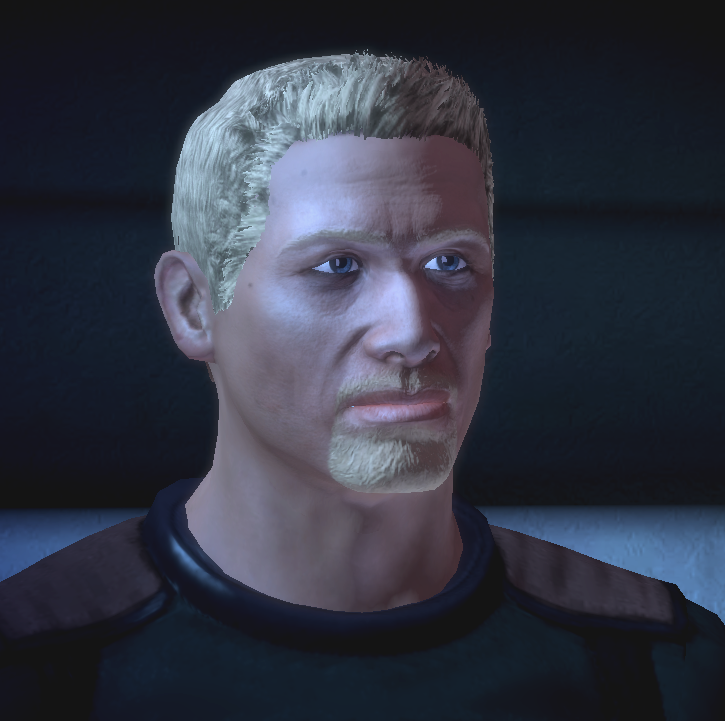Immersion. When I
think of the word “immersion”, I see myself being lost in a game’s world. I focus on the screen and ignore everything
else, unaware of how much time is passing in the real world. I become the character and never truly stop
playing even after I’ve pressed the pause button. I’ve known about what immersion is for a while, but something
happened that made me realize just how effective it is as a tool; a tool not
just for having fun with a game, but discovering more about ourselves.
The game was Mass Effect.
One of the first 360 games I ever decided to give a try, and it was incredible. It had action, drama, a rich universe, and a
villain voiced by the same actor who gave Kakuzu his excellently villainous voice in Naruto.
That presentation was backed up by flowing gameplay that
never stopped, even during exposition.
Mass Effect constantly kept me involved with its dialogue choices and
moral choice system, making me really feel like my hero onscreen (helped by the
character being customized to look a lot like me).
 |
| You know how it is... |
In my first playthrough I did what came naturally, making
choices I would make in the situations given, like any normal gamer would
do. Overall I was practically a saint,
always taking peaceful solutions and racking up paragon points. I only got a few renegade points for relatively
harmless acts and misinterpretations on the part of either me or the game.
After beating the game, I felt I didn’t do enough sidequests,
so I made a new game to explore outside of the main story more. However, I already played as myself, so I decided
to role play as someone else entirely for different results.
Thus began the adventures of commander Jerk Shepard: Asshole
Extraordinaire. Jerk killed people when
he could, punched reporters, insulted his crew, cut off the council, and always
chose the aggressive option when available.
It was funny for a while, sadistically laughing at people’s reactions to
Jerk being one of the most unlikable bastards in the galaxy (and when you’re a
Specter, they can’t do a thing about it).
But then one particular incident happened, and I did not laugh at all.
Conrad Verner. Most
people who have played Mass Effect likely already know where I’m going with
this, but for those who haven’t, Conrad is basically Commander Shepard’s
fanboy, and greatly idolizes him. Conrad told Jerk that he thought he could be a Specter too, since Jerk was the first
human specter and gave him hope.
If this were my original playthrough, I would’ve sternly,
but calmly told him of the dangers that comes with being a specter, patted him
on the shoulder, told him to train, and maybe would’ve signed an autograph (had
any such options been given).
Jerk Sheppard had a different way of telling him how hard
being a Specter is. Jerk aimed a gun at
Conrad’s face, saying “This is what it feels like having a gun to your
head! I go through this every day!” He went on to say that Conrad didn’t have
what it took and, after Conrad started whimpering, also said that the guy was pathetic.
After that debacle, Conrad practically cried, saying that he
thought Jerk was a hero, and that heroes aren’t supposed to act that way, before
running away.
It is at that point I stopped, controller still in hand, and
thought. “Wow… I’m an &^$%#*#.” It was a genuine emotional response.
Mass Effect was so immersive, and the graphics and voice
acting were so convincing, for a brief moment, I couldn’t help but feel like what I had done wasn’t
just in a game. I really felt like I had
just ruined someone’s hopes and dreams.
Like I had ruined myself as that man’s role model, and made him feel
like dirt at the same time. I saw a bit
of myself in Conrad. I can’t imagine how
crushed I would be if one of my heroes threatened or insulted me.
A similar feeling happened later in the game. Emily Wong, a journalist character who is not so
well-liked, asked Jerk to plant a bug for her to do a
story on poor working conditions. Had this been my initial playthrough, I’m
not sure what I would have done.
On one hand, being a journalism major, it’s in my nature to
help other journalists, and a story like that could do some good. On the other hand, her methods may have been shady. I don’t know how much the law has changed in
the future of Mass Effect, but when I come from, bugging is an invasion of
privacy.
But what did Jerk decide on?
He said he’d do it, then went back and lied by saying he placed the bug. When Wong said she didn’t get a signal, Jerk
insisted that they must have found it, but still accepted payment for placing it. Then Wong, depressed, went back to talk to
her editor about another story subject.
Ignoring that Jerk never went ANYWHERE outside of Wong’s
sight before saying he planted it, that was a dick move on many levels.
Firstly, lying is wrong, especially in this case. It’s an
excuse to get out of Jerk’s own laziness.
Secondly, he accepted payment for nothing.
That is stealing! Lastly, that poor journalist is going to be
pressed for a story now. I know what
it’s like for a story I’m looking forward to or was working on to be shot down
because of a lack of cooperation. Like
Conrad, I saw a bit of myself in the way Emily Wong walked away from Jerk. That was Mass Effects way of saying “You are
no less evil than Saren!” Sure, Jerk had punched her earlier, but in that case, the audacity of it was actually pretty funny. In this case, it was more relatable.
Therein lies the brilliance of Mass Effect. It is so immersive, it makes it difficult to lie to yourself. “To thine
own self be true.” As much as you try to
repress choosing the choices you would ordinarily, you won’t be able to escape its
full emotional potential. Even before
the Conrad scene, I hesitated to choose some of the options before reminding myself
“wait… I’m Jerk Shepard.” I had to
consciously play against who I really am, which tells me that I’m a good person
at heart. That is immersion, and one of
the big reasons Mass Effect is one of my favorite games of the
generation.
The aforementioned Conrad scene is at the 4:50 mark.

No comments:
Post a Comment